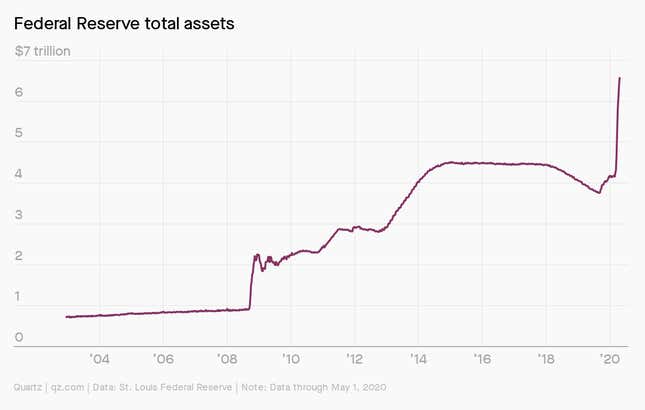Good morning, Quartz readers!
Here’s what you need to know
UK-US trade talks begin. The first round of negotiations over a post-Brexit transatlantic free-trade agreement will involve 100 officials from each side and is expected to last two weeks.
Ireland gets ready to re-open. The limit for exercising has been extended to within 5 kilometres (3 miles) of one’s home, and people over 70 will now be allowed outings with appropriate social distancing. Most other lockdown measures remain in place until May 18, when outdoor work will resume and some shops re-open.
Angela Merkel meets with auto industry executives. The German chancellor will discuss the impact of Covid-19 on production and sales, a day after the sector reported its biggest slump in April, with the industry business index dropping to its lowest level since 1991.
WeWork’s co-founder sued SoftBank. Adam Neumann accused the Japanese conglomerate, its biggest investor, of abusing its power when it terminated a $3 billion tender offer for the co-working company’s shares.
The US will borrow $3 trillion in the second quarter. The unprecedented sum is more than five times what the government borrowed in a single quarter during the 2008 financial crisis, as the government finances massive stimulus efforts to revive the economy.
Charting central bank assets
Protecting an economy from a pandemic isn’t cheap, and central banks are going to buy a lot of their governments’ debt. The US Federal Reserve’s assets are skyrocketing. The balance sheets at the European Central Bank and Bank of Japan look pretty similar.

Around the world, central-bank asset purchases are expected to reach $6 trillion this year.
For Quartz members
Check out Quartz membership with a ✦ seven-day free trial.
- $5 trillion: Amount officials are currently spending and lending to keep their nations afloat—and they’ll have to pay it back.
- 60%: Amount of attendees at our workshop on career building in quarantine who are currently seeking new jobs.
- 20%: China’s decrease in Active Pharmaceutical Ingredient production during lockdown, which is majorly affecting the global drug supply.
We’re obsessed with microwaves
Americans love zapping their meals. Born out of World War II innovation, the microwave has become a staple in US homes, making up a $3.7 billion market in 2006. New lines of trendy, “healthy” microwavable meals have led to a renaissance of reheating and a food subculture that has given us the “world’s saddest cookbook.” Instantly read today’s Quartz Daily Obsession.
Surprising discoveries
Garter snakes aren’t very good at social distancing. Unlike other solitary reptiles, these harmless serpents like to hang out together and even appear to develop friendships.
A five-year-old boy tried to drive from Utah to California. When pulled over, he told a highway patrol officer that he was making the trip to buy a Lamborghini.
Facebook trained its chatbot on 1.5 billion Reddit posts. Blender is still a work in progress, though, as it sometimes responds with offensive language and made-up facts.
An Indian man was arrested for making booze out of hand sanitizer. Liquor shops in his home state of Madhya Pradesh are closed during lockdown.
A rogue drone shut down Latvian air traffic. All flights below 19,500 feet (6,000 meters) are suspended while authorities search for the drone, which drifted off during a test flight.
You asked about antibody tests
Why is there such a widespread number of people who have tested positive for antibodies to Covid-19?
At this stage, Sean, antibody tests don’t tell us much, if anything, about immunity. Research on other coronaviruses suggests that some people will likely get some kind of immunity to re-infection after being infected with and developing antibodies to SARS-CoV-2.
But it’s simply too soon for scientists to know what concentration of antibodies would be needed, how long that protection might last, or how powerful it will be (not all antibodies are equally effective at neutralizing the virus). Most antibody tests only give a yes/no answer, not the kind of detail needed to understand immunity. Data from China suggest that some individuals, particularly young people, may even beat an infection without developing antibodies at all.
At this stage, it’s best to take antibody results with a big grain of salt. (Give our test simulator a whirl to see why.)
✉️ Do you have a burning question about how coronavirus is changing the world?
Our best wishes for a productive day. Please send any news, comments, sanitizerd booze, and dream cars to hi@qz.com. Get the most out of Quartz by downloading our app on iOS or Android and becoming a member. Today’s Daily Brief was written by Mary Hui and edited by Isabella Steger.